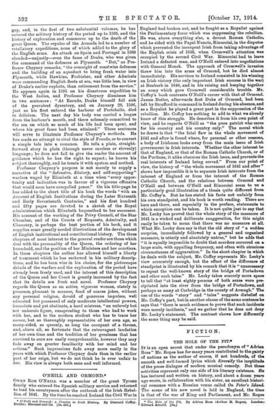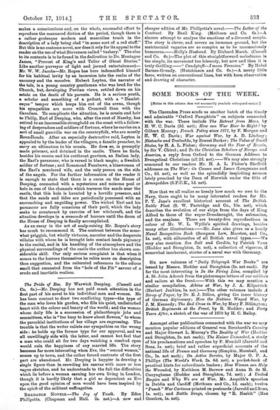FICTION.
THE HOLE OF THE PIT.•
IT is an open secret that under the pseudonym of "Adrian Ross" Mr. Ropes has for many years contributed to the gaiety of nations as the author of scores, if not hundreds, of the smooth and well-turned lyrics which diversify the ineptitude of the prose dialogue of modern musical comedy. But these activities represent only one side of his literary existence. He has lectured and written on history, and about a dozen years ago wrote, in collaboration with his sister, an excellent histori- cal romance with a Russian venue called On Peter's Island. The scene of his new novel is laid in England, the time is that of the war of King and Parliament, and Mr. Ropes • The Hole of the Pit. By Adrian Rose (Arthur B. Bores). London: Edward Arnold. [6i.J makes a conscientious and, on the whole, successful effort to reproduce the mannered diction of the period, though there is a rather grotesque modern and masculine touch in the description of a lady being clad " in some sort of a red stuff." But this is no costume novel, nor does it rely for its appeal to the reader on the use of what Stevenson called " tushery." The clue to its contents is to be found in the dedication to Dr. Montague James, "Provost of King's and Teller of Ghost Stories." Like another purveyor of light and jocund entertainment— Mr. W. W. Jacobs—Mr. Ropes has here indemnified himself for his habitual levity by an incursion into the realm of the uncanny and the macabre. Hubert Leyton, the narrator of the tale, is a young country gentleman who was bred for the Church, but, developing Puritan views, settled down on his estate on the death of his parents. He is a serious youth, a scholar and something of a pedant, with a " Hamlet- esque " temper which keeps him out of the arena, though his sympathies are more with Cromwell than with the Cavaliers. To complicate the situation, he is cousin and heir to Philip, Earl of Deeping, who, after the rout of Naseby, has retired to an inaccessible stronghold on the coast with a follow- ing of desperadoes and soldiers of fortune, where he carries on a sort of small guerrilla war on the countryfolk, who are mostly Roundheads. After an especially destructive raid, Leyton is appealed to by the leader of the villagers, a fanatic preacher, to carry an ultimatum to his cousin. He does so, is promptly made prisoner, and detained in the castle. There he finds, besides his cousin and his cutthroat garrison, an Italian lady, the Earl's paramour, wbo is versed in black magic; a Swedish soldier of fortune ; and Rosamond Fanshawe, a kinswoman of the Earl's murdered wife, and the only person on the side of the angels. For the further information of the reader it is enough to state that there is a curse on the House of Deeping, connected with a mysterious and noisome pool or bole in one of the channels which traverse the sands near the castle, that this hole is haunted by a horrific presence, and that the sands and tides are periodically possessed with an encroaching and engulfing power. The wicked Ear] and his paramour are fully conscious of their peril, which the lady seeks to counteract by exercise of her witchcraft, and the situation develops in a crescendo of horrors until the doom of the House of Deeping is finally accomplished.
As an essay in the art of scalp-raising Mr. Ropes's story has much to recommend it. The contrast between the some- what priggish, but wholly virtuous, narrator and the desperate villains with whom he is brought into contact lends piquancy to the recital, and in his handling of the atmosphere and the physical surroundings of the castle the author has shown con- siderable skill. Our only serious complaint is that when it comes to the horrors themselves he relies more on description than suggestion, and the reiterated references to the odious smell that emanated from the "hole of the Pit" savour of a crude and inartistic realism.



































 Previous page
Previous page